#our great tchaikovsky
Note
Oh my hey! Please, if you haven't already, please, could you do if you haven't please do favorite singer and song of the sdv bachelor/ettes
Oh, this is the first time I've posted an ask about a topic like this, so I hope I did it right. Thanks for the question, and have a great day! 🫰💕
_________________________________________
SDV bachelors:
Harvey's radio will always play Louis Daniel Armstrong or Ella Jane Fitzgerald because the doctor loves listening to jazz. If he wants something more energetic, Harvey will switch to the Latin music radio channel. He's sure to start dancing in the kitchen when Pete Rodríguez's "I Like It Like That" comes on. With music like that, cooking dinner becomes more interesting and fun.
It may sound pretty cliche, but Alex will definitely have a workout playlist with songs from the 80s rock and roll, pop rock and metal genres. Stan Bush ("Touch", "Fight for survive", "Never surrender"), Paul Engemann ("Push it to the limit, "The Eagle Lands"), Survivor ("Eye of Tiger"), Judas Priest ("All guns blazing", "The Sentinel") would be his favorites.
I'm sure Sebastian will be a fan of alternative rock (Nirvana - "Smell like teen spirit" and "Lithium"), emo-core (Taking back Sunday - "Cute without an "E") and electronic rock (almost all Celldweller albums, his favourite album is "Wish upon a Blackstar"). I also think that Sebby often likes to enjoy breakcore, not really remembering the specific artists and listening to whatever he likes. This is how I imagine Sebastian trying to explain to his mom what breakcore is (Warning: loud).
It's quite difficult with Sam because he's a real melomaniac. He listens to absolutely everything and almost all the time. Depending on his mood, he can listen to both heavy metal and pop music. However, the most frequently played bands in his music player are definitely the Beatles (his two favourite albums are "Help" and "Yellow submarine"), Coldplay ("Yellow") and Arctic Monkeys (the album"AM"). And also any popular song that gets stuck in his head (California girls we're unforgettable, daisy dukes bikini on top-).
Classics for Elliott! Our dear writer - and without masterpieces of classical music? Unthinkable! Mozart, Beethoven, Tchaikovsky, Vivaldi, Grieg, Debussy - all either playing in his little radio on the table, or the writer himself sits down at his piano and plays music by famous composers. He also loves modern classical music, and sometimes light jazz.
Shane listens to rock and heavy metal like Metallica, Ramstein, AC/DC all the time and you won't change my mind (I'll fight for that headcanon). I like to think he just lies on his bed, turns on his music player and plays the loudest heavy rock you can imagine in his headphones. One of his favourite songs that he listens to all the time is "For whom the bell tolls" (Metallica).
SDV bachelorettes:
Actually, I always thought that Maru would like synthwave and retrowave genre. I don't know why, but it would be just her style to include a playlist with synthwave artists (all Home songs, especially "Resonance" and "Head first"). If this genre is a too calm and the young inventor wants something a bit more energetic, her choice would be Daft Punk (Around the world, around the woooooooooooooorld!) or Disclosure ("Grab her" and "Omen" are her favorite songs).
Abigail's choices are quite chaotic. One moment she can listen to dark electro (Owl vision - "Horus" and "Holy shit"), and the next moment the amethyst lover admires folk music and promises herself that she will also learn to play the flute (Percival Schuttenbach - almost all songs, but especially "Karanfilce" and "Lazare", as well as Sowulo - the whole album "Sol"). She is also a lover of video game soundtracks and dark ambient. As I said before, pretty chaotic music taste.
All the popular pop, dance-pop and R&B you can think of - that's what Haley's playlist is. Ariana Grande, Doja Cat, Rihanna, Beyoncé, Britney Spears.... Haley doesn't have a particular favourite song, she likes everything. In the evening she likes to listen to the same pop and dance music songs, but in slowed down version + reverb.
Emily just can't live without energetic dance music. She could probably compete with Sam for the title of Starview Valley's music lover. And the genres can be diverse: from electro-swing (Caravan Palace) to Latin music (don't play Kaoma - "Lambada" in front of her, otherwise she will drag you to dance), from RnB (Beyoncé) to disco (Bee Gees).
When classical music is played, Penny falls into a melancholic mood. She is particularly affected by Claude Debussy's cycle of six piano pieces "Children's Corner", and she loves to listen to the piano version and the orchestra version equally. Besides classics, the young teacher also likes to listen to Enya (she always sheds tears when she listens to "May it be" or "Aniron"). But Penny will shed real rivers of tears if she hears the soundtrack from Titanic (especially "Hymn to the Sea").
If you ask Leah about her favourite music, the artist will name you a few groups of indie music and alternative music. After all, those are her favourite genres. In her free time, she sometimes likes to relax listening to Slenderbodies (especially "Belong" and "Opal ocean"), or Glass Animals (she can listen to the whole "Zaba" album all day long and she won't get bored). Leah also loves listening to songs by the indie duo King of Convenience (especially "Mrs Cold").
#stardew valley#sdv#sdv headcanons#sdv alex#sdv sebastian#sdv shane#sdv elliott#sdv harvey#sdv sam#sdv abigail#sdv penny#sdv maru#sdv leah#sdv emily#sdv haley#thanks for the ask!
74 notes
·
View notes
Text
Rewind the Tape —Episode 1
Art of the episode
During our rewatch, we took note of the art shown and mentioned in the pilot, and we wanted to share. Did we miss any? Do you have any thoughts about how these references could be interpreted? How do you think Armand and Louis go about picking the art for their penthouse in Dubai?

The Fall of the Rebel Angels
Peter Bruegel the Elder, 1562
This painting is featured in the Interview with the Vampire book, and it was important enough to be included in the draft pilot script!

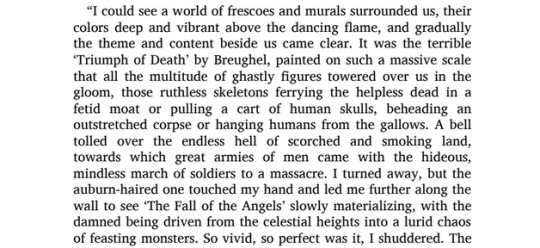
Bruegel the Elder was among the most significant Dutch and Flemish Renaissance artists. He was a painter and print-maker, known for his landscapes and peasant scenes.

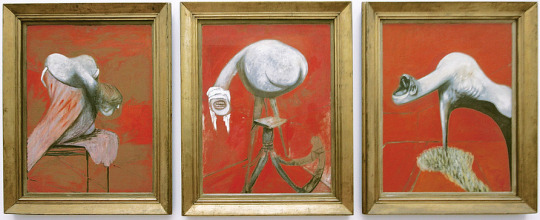
Three Studies for Figures at the Base of a Crucifixion
Francis Bacon, 1944
Bacon was an Irish figurative painter, known for his raw, unsettling imagery and a number of triptychs and diptychs among his work. At a time when being gay was a criminal offense, Bacon was open about his sexuality, and was cast out by his family at 16 for this reason. He destroyed many of his early works, but about 590 still survive.
The Tate, where these paintings are displayed, says this about the work: "Francis Bacon titled this work after the figures often featured in Christian paintings witnessing the death of Jesus. But he said the creatures represented the avenging Furies from Greek mythology. The Furies punish those who go against the natural order. In Aeschylus’s tragedy The Eumenides, for example, they pursue a man who has murdered his mother. Bacon first exhibited this painting in April 1945, towards the end of the Second World War. For some, it reflects the horror of the war and the Holocaust in a world lacking guiding principles."
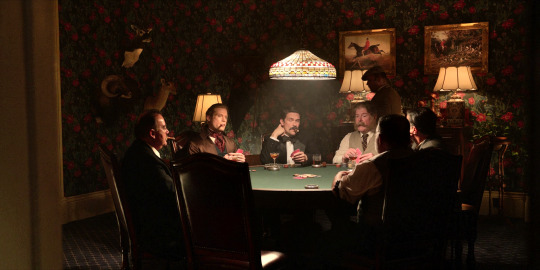
On the Hunt or Captain Percy Williams On A Favorite Irish Hunter and Calling the Hounds Out of Cover
Samuel Sidney, 1881 [Identified by @vfevermillion.] and Heywood Hardy, 1906 [Identified by @destinationdartboard.]
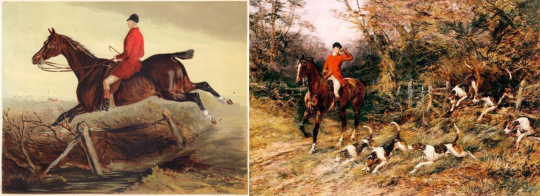
Sidney was an English writer, and his prints usually accompanied his publications about hunting, agriculture, and about settling Australia during the colonial period. Hardy, also British, was a painter, in particular an animal painter.
There's also a taxidermy deer, ram, and piebald deer on the wall.
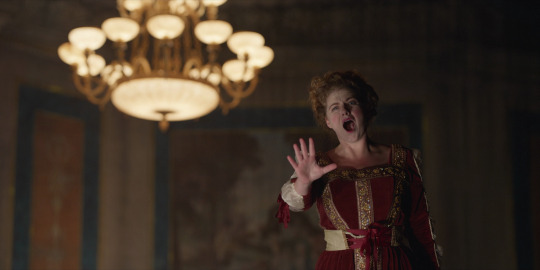
Iolanta
Pyotr Tchaikovsky, 1892
The opera Louis and Lestat go to was composed by Tchaikovsky, another gay artist. The play tells a story "in which love prevails, light shines for all, lies are no longer necessary and no one must fear punishment," as put by Susanne Stähr for the Berliner Philharmoniker.

Strawberries and Cream
Raphaelle Peale, 1816 [Identified by @diasdelfuego.]
Peale is considered to have been the first professional American painter of still-life.

Outfits inspired by J.C. Leyendecker
Leyendecker was one of the most prominent and commercially successful freelance artists in the U.S. He studied in France, and was a pioneer of the Art Deco illustration.
Leyendecker's model, Charles Beach, was also his lover of five decades. You can read costume designer Carol Cutshall's thoughts on these outfits on her Instagram.

The Artist's Sister, Melanie
Egon Schiele, 1908 [Identified by @dwreader.]
Schiele was an Austrian expressionist painter and protege of Gustav Klimt. Many of his portraits (self portraits and of others) were described as grotesque and disturbing.
A Stag at Sharkey's
George Wesley Bellows, 1909 [Identified by @vfevermillion.]
Bellows was an American realist painter, known for his bold depictions of urban life in New York City.

Mildred-O Hat
Robert Henri, undated (likely 1890s) [Identified by @nicodelenfent, here.]
Henri was an American painter who studied in Paris, where he learned from the Impressionists and determined to lead an even more dramatic revolt against American academic art.
Starry night
Edvard Munch, 1893 [Identified by @vfevermillion.]
Munch was a Norwegian painter, one of the best known figures of late 19th-century Symbolism and a great influence in German Expressionism in the early 20th century. His work dealt with psychological themes, and he personally struggled with mental illness.
If you spot or put a name to any other references, let us know if you'd like us to add them with credit to the post!
Starting tonight, we will be rewatching and discussing Episode 2, ...After the Phantoms of Your Former Self. We hope to see you there!
And, if you're just getting caught up, learn all about our group rewatch here ►
#louis de pointe du lac#daniel molloy#lestat de lioncourt#vampterview#interview with the vampire#iwtv#amc interview with the vampire#interview with the vampire amc#amc iwtv#iwtv amc#IWTVfanevents#rewind the tape#in throes of increasing wonder#analysis and meta#art of the episode
95 notes
·
View notes
Text
S&Co Sherlock recommended Vivaldi to John and I Lost My Mind
The fact that our Sherlock Holmes recommended Vivaldi to John so suddenly and apruptly is something SO personal! When I read a transcript of the mailbag episode (thank you @eardefenders ) I could NOT stop thinking about it, and have been listening to his many wonderful concertos since. I work in a church choir and am therefore somewhat classically trained, I have also played violin for many years as a child, and still do at times, so allow me to go on a geeky tirade about Antonio Vivaldi and Sherlock's understanding of John.
🎻🌱🌻🍂❄
In the second mailbag episode, a question is asked "If you could make a Spotify playlist for eachother of your own favourite songs, what would some of the highlights be [...] ?"
John answers with the rockband Elbow, who use orchestra and especially strings in their music. Which is why he recommends it to armature violinist Sherlock Holmes. Sherlock says that he would probably never make such a playlist, as he wouldn't find the task fulfilling, but he has an epiphany and IMMEDIATELY interrupts himself, not even finishing his sentence, and he simply says "Vivaldi". I have not heard the delivery of this line(cause I'm poor ✌), but the fact that the answer falls to him so suddenly and it simply MUST leave him immediately so John hears is delicious characterisation. Sherlock also answers with pop, as John likes popculture (a somewhat less personal answer, but still very considerate).
After another question it is established that Vivaldi isn't even a favourite of Sherlock's. He much prefers Mozart, Bach(I will come back to Bach) and Tchaikovsky. Now Sherlock is a violinist, so there is no way he has escaped the genius of Antonio Vivaldi, like he's escaped pop. And so this recommendation is really because he feels John would like it.
But why does Sherlock think that? What would John Watson, a middle class everyman, like about Vivaldi?
Let me tell you:
When we analyse the symbolic meaning of instrumental classical(in this case baroque) music, we often look at the biography of the composer (Vivaldi gives us a little more to work with, which I will return to). I will start here. Antonio Vivaldi of Venice was taught the violin by his father and was ordained at 25 but didn't work as a priest for long due to illness. He instead became a violin teacher and composer. (Who else do we know that took up a very respected line of work but ended up where his father did? Why John Watson of course!) Vivaldi taught abandoned girls at an orphanage for more than 30 years, and saw immense potential in them and their education. The most talented of the girls stayed into adulthood as a part of their renowned orchestra and choir. He wrote most of his music for these girls and women to perform. He also took the talented singer Anna Tessiseri Giro and her sister under his wing, and Anna became his protégé. What a great guy! Supporting the talents of young women! Of course John would love him.
Going into Vivaldi's musical genius, we have to talk about baroque music. Vivaldi left a huge mark on the late baroque period. Especially the form of concertos which I won't bore you with (🤓), but also the general style of the period. That style is characterised by grand ornamentation (like the baroque in general), driving movement (in rythm) and contrast such as ascending and descending notes. All this produces beautiful an grand pieces. Additionally, Vivaldi used melodic repetition(his critics say too much), which is what gets the new hit pop song stuck in our heads. Something our John is very prone to suffer under. Vivaldi also took a narrative approach to music. Not only through his many operas, but also in his concertos. Everyone knows his Four Seasons, whether you want to or not. He wrote four concertos, one for each season, and for each season there was an accompanying sonnet(which he presumably wrote). These concertos and sonnets depict both the gentleness and wrath of nature, all beautiful. But also people: herders, shepherds, drunk peasants celebrating the harvest and hunters. These are working people that Vivaldi chose to portray. John has a working class background, despite his social climb, he still shares most empathy with these people. Of course he would enjoy a celebration of their troubles and joys throughout the year.
Now back to Bach. A baroque man that Sherlock enjoys. The baroque ends with Bach, that is atleast what I've been taught. All of the period leads up to him. His complicated polyphonic(2 or more lines of melody at once) pieces are iconic and definitive of the period. And who inspired J. S. Bach? Well Vivaldi of course! Bach adapted several of Vivaldi's works and quoted him directly in his own compositions. Bach used bigger orchestras and different instruments (organ and harpsichord as he played them himself) and his works are generally more complicated than Vivaldi's Italian one-melody-centric works, but Bach is the metaphorical student! And Sherlock must absolutely be aware of this.
To me reading the mailbag episode, Sherlock started out uninterested, but the question had him think through his favourites. All complicated and very much not to John's tastes. But when thinking of Bach he went back to Vivaldi, which you must, and he is different. Vivaldi the sick priest, Vivaldi the teacher, the life long supporter of young womens' and abandoned girls' careers. Creative Vivaldi, Vivaldi the storyteller, which John is also. Vivaldi who celebrates nature and the dramatic lives of incredibly normal working people. Vivaldi and his repetitive melodies, although not in Sherlock's taste, fits John's so well. Vivaldi who inspired Bach. John who inspires Sherlock. ❤🎻
Tirade over! Thank you for reading. If you want to listen to some of Vivaldi's work I recommend The Four Seasons and a spot near a window with a suitable drink for the weather in your part of the world. For Bach you might want to look up whether your local church/music school holds concerts or similar events where Bach features, organ is a thousand times better live (if not, stick to his piano or string work).
#sherlock & co#sherlock holmes#dr john watson#My mind is only slightly elated#the brainrot continues#sherlock and co
131 notes
·
View notes
Photo
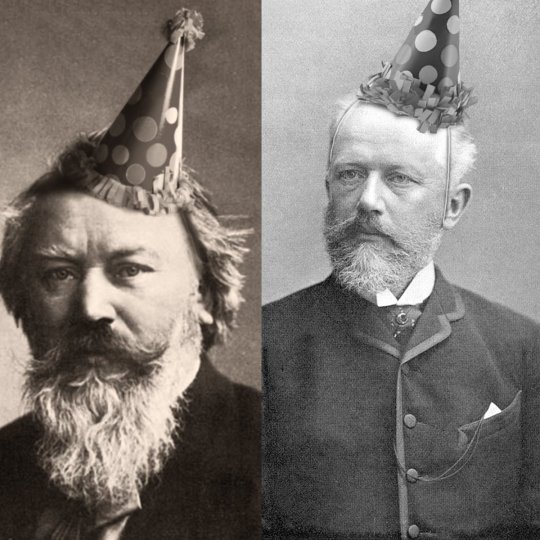
I have played over the music of that scoundrel Brahms. What a giftless bastard!
- Tchaikovsky writing in his diary in 1886.
Russian composer Pyotr Tchaikovsky had a lot to say about Brahms’ music- all bad. Johannes Brahms, for his part, didn’t seem to much enjoy Tchaikovsky’s music, either. He attended a rehearsal for Tchaikovsky’s Fifth Symphony and fell asleep. Although the two composers share a birthday - 7 May, with Brahms, born in 1833, being seven years older - they illustrate opposite poles of the composing spectrum. Brahms was the great classicist, building vast symphonies and concertos with intricate musical logic; Tchaikovsky was the heart-on-sleeve emotionalist, as colourful as Brahms was sober.
Peter Ilyich Tchaikovsky and Johannes Brahms simply understood, felt and composed music very differently, and judged each other’s work accordingly — sometimes positively, sometimes brutally.
Tchaikovsky was far more an antagonist than Brahms. The Russian composer’s chief criticism of Brahms’ music was that it was too controlled and not emotional enough. In a letter to his patron in 1879, he wrote of Brahms’ violin concerto, “His music is not warmed by true feelings, there is no poetry in it, though it has great pretension to depth.”
As for Brahms, stories have long circulated that he fell asleep at a performance of a Tchaikovsky symphony. There’s no evidence that this actually happened, but it’s true that Brahms was often seen taking an afternoon snooze in the cafes of Vienna and was known to fall asleep at the table or theatre.
Composers are rarely members of a mutual admiration society, but Tchaikovsky’s concerns seem to focus more on style than on musicianship. “Hard as I try to respond to his music,” he adds, “I remain cold and hostile. It is a purely instinctive feeling.”
In his diary, he was even more explicit, calling Brahms a “giftless bastard,” and his work “self-inflated mediocrity.” But his opinion seems to have softened in 1887, shortly after being invited for Christmas dinner at the Leipzig home of a friend, where he was “astonished” to find Brahms at the table, as well.
Brahms was there to rehearse his Piano Trio in C minor, Op. 101, and Tchaikovsky sat through the whole piece and made no critical comment. Writing a friend about the evening, Tchaikovsky called Brahms “a very nice person, and not at all proud as I had imagined.”
It was a major breakthrough, and Tchaikovsky would spend six days in Leipzig, encountering Brahms several more times. He wrote home that the German composer did everything he could to be agreeable — but was far better as a drinking companion than as a conversationalist.
Brahms attended a rehearsal for the Leipzig premiere of Tchaikovsky’s Orchestral Suite No. 1, and expressed approval of the first movement, but strongly criticized the jovially childlike march (which to our ears points ahead to the sound world of the Nutcracker).
A year later, Tchaikovsky arrived in Hamburg to find Brahms there, planning to attend a rehearsal of Tchaikovsky’s new Fifth Symphony. Having heard the piece, Brahms told Tchaikovsky he approved of the first three movements but disliked the finale.
Honest criticism like this rarely upset Tchaikovsky - and, besides, he hadn’t liked any of Brahms’ symphonies, either.
“Brahms is very amiable,” he wrote to his brother. “After the rehearsal we had lunch together and drank well. He is a very sympathetic person and I like his integrity and simplicity.” Tchaikovsky even tried—unsuccessfully—to persuade Brahms to conduct in Moscow during the next season.
Brahms was the one contemporary who, both in output and stature, matched Tchaikovsky, and public comparisons were expected. But, in a somewhat endearing turnabout, the two rival composers grew to appreciate each other as individuals, if not always approving of each other’s music.
#tchaikovsky#quote#brahms#classical music#composer#music#feud#arts#culture#musicians#sympahony#concerto#history#friendship#rivalry
157 notes
·
View notes
Text

Welcome to the Russian Period Dramas Bracket everyone! The order of things will look something like this:
Polls will start posting tomorrow. One group (A, B, C, D) will be posted per day, starting with Group A. Polls will run for a week. Once all polls for a round close, polls for the following round will begin posting within 24-48 hours (depending on mod availability). You may send in asks with “propaganda” if you wish.
Round 1 matches are listed out below for a full text version. Note that titles are listed in the format: English tittle (official/”official”* or translated) | transliterated title. (*There are occasionally some variations in what is the “official” English title. I tried my best here, usually prioritizing what is used by a major streaming service or wiki).
GROUP A
Ekaterina: The Rise of Catherin the Great | Ekaterina (2014) vs. Pushkin: the Last Duel | Pushkin: Poslednyaya duel (2006)
The Barber of Siberia | Sibirskiy tsiryulnik (1998) vs. Tchaikovsky's wife | Zhena Chaikovskogo (2022)
The Duelist | Duelyant (2016) vs. Life of a Mistress | Volnaya gramota (2018)
Catherine the Great | Velikaya (2015) vs. Poor Nastya | Bednaya Nastya (2023)
Detective Anna | Anna – detectiv (2016) vs. Gardes-marines Ahead! | Gardemariny, vperyod! (1988)
Bloody Lady | Krovavaya Barinya (2018) vs. Institute For Noble Maidens | Institut blagorodnykh devits (2010)
Union of Salvation | Soyuz spaseniya (2019) vs. Star of Captivating Happiness | Zvezda plenitelnogo schastya (1975)
Russian Ark | Russkiy kovcheg (2002) vs. Poor Poor Paul | Bednyy bednyy Pavel (2003)
GROUP B
The Silver Skates | Serebryanyy konki (2020) vs. Sins of Our Fathers | Grekhi ottsov (2004)
Bezsonov (2019) vs. Voskresensky (2021)
Sunstroke | Solnechnyy Udar (2014) vs. The Fall of the Empire | Gibel imperii (2005)
Matilda (2017) vs. Gloomy River | Ugryum-reka(2021)
The Road To Calvary | Hozhdenie po mukam (2017) vs. How the Steel Was Tempered | Kak zakalyalas stal (1973)
Admiral (2008) vs. Quiet Flows the Don | Tikhiy Don (2015)
Morphine | Morphiy (2008) vs. Battalion | Batalyon (2015)
Rasputin | Grigoriy R (2014) vs. Christmas Trees 1914 | Yolki 1914 (2014)
GROUP C
War and Peace | Voyna I mir (1966) vs. The Queen of Spades | Pikovaya dama (1982)
Pechorin (2011) vs. A Hero of Our Time | Geroy nashego vremeni (2006)
Eugene Onegin | Yevgeny Onegin (1959) vs. A Cruel Romance | Zhestokiy romans (1984)
Gogol (2017) vs. The Idiot | Idiot (2003)
Anna Karenina: Vronsky’s Story | Anna Karenina. Istoriya Vronskogo (2017) vs. Anna Karenina (2009)
Crime and Punishment | Prestuplenie i nakazanie (2007) vs. Brothers Karamazov | Bratya Karamazovy (2009)
Fathers and Sons | Ottsy i deti (2008) vs. Lady Into Lassie | Baryshnya krestyanka (1995)
Two Women | Dve zhenshchiny (2014) vs. The Emperor’s Love | Lyubov imperatora (2003)
GROUP D
Sophia (2016) vs. The Youth of Peter the Great | Yunost Petra (1980)
Furious | Legenda o Kolovrate (2017) vs. Alexander: The Neva Battle | Aleksandr. Nevskaya bitva (2008)
Viking (2016) vs. Iron Lord | Yaroslav: Tysyachu let nazad (2010)
The Terrible | Groznyy (2020) vs. Tsar (2009)
Godunov (2018) vs. Schism | Raskol (2011)
Land of Legends | Serdtse Parmy (2022) vs. Golden Horde | Zolotaya Orda (2018)
Conquest | Tobol (2019) vs. Secrets of the Palace Revolutions | Tayny dvortsovykh perevorotov (2000)
Elizabeth | Elizaveta (2022) vs. Cathedral | Sobor (2021)
#russian period dramas#russian period dramas bracket#tumblr bracket#tumblr polls#period dramas#perioddramaedit#russian tv#russian movies#russian media
22 notes
·
View notes
Note
Hello!
I have a question about Basque names, and I'd like to hear your opinions.
In school (in the US), I had a classmate with a name from the Basque language (with the spelling slightly changed to match English spelling - as far as I can tell, it was pronounced the same). She said that, although her parents had no strong connection to Basque culture, they thought it was a beautiful name and liked the meaning.
I was wondering - do you think non-Basque people using Basque names is offensive/cultural appropriation, or do you think it shows appreciation for the language and culture? Does changing the spelling or pronunciation change your opinion?
Kaixo anon!
Again, I'll speak solely from my perspective and my opinion can't be understood as the same most Basque people have.
For me giving your child a Basque name - with or without having a connection with EH - is perfectly fine, almost a celebration of our culture: our names were prohibited for decades, so it's cool that now they broke out our borders and there are people with Basque names all around the world.
That said, if you choose a Basque name, be sure to know the correct spelling and meaning (if there's any). I don't care if parents change the spelling to fit their mother tongue's pronunciation rules. Basque has its own rules, and if you're not going to respect them why on earth would you choose a Basque name? If people can pronounce Schwarzenegger and Tchaikovsky they can assume that Maite sounds My-te and not May-te (just an example).
Regarding the meaning, same thing. Some parents find the meaning on a baby name site or some random blog and call it a day. Euskaltzaindia offers valuable online resources about Basque names for everyone interested.
So in a nutshell: if you're gona give your child a Basque name, great! But remember Basque is a living language and not some sort of fantasy. I assume parents interested in Basque names are actually interested in them - origin, meaning, pronunciation - beyond their uniqueness and exotic sound. If they're too complicated to pronounce in your mother language, maybe you should choose other names before
40 notes
·
View notes
Text
Lost, but not forgotten || 𝐕𝐨𝐥𝐭𝐮𝐫𝐢 𝐊𝐢𝐧𝐠𝐬 (𝗛𝗖)

ʀᴇQᴜᴇꜱᴛᴇᴅ ʙʏ @mywinterivy : "THE TIME HAS COME- forgive me for the influx of requests coming, I’m very excited
I absolutely loved your headcanons of the Kings with an artist/theatre/musician mates, and I was thinking of something:
You know how famous artists and writers (Van Gogh, Dickinson, Poe, Bach, etc.) died relatively unknown only for their work to become popular later? Imagine the King’s mate being some kind of artist (painter, actor, singer, composer, etc.) who’s art wasn’t recognised by the time they faked their death/turned into a vampire, only for their work to be ‘rediscovered’ a few years/decades afterwards and become famous.
(Documentaries are made, exhibitions, people recognise paintings/music playing on the first/public floors, movie or tv adaptations of their novels, etc.)
How would the Kings react? I feel like the mate may have some mixed feelings about it, flattery, bitterness, embarrassment, pride, annoyance, gratitude? How would they deal with that?"

I do indeed understand where you come from. Sadly so many of our great artist’s do not see the appreciation they deserved in their lifetime, only for us to gobble it up now. Personally I would hope this was my trajectory if I was blessed with immortality, I would enjoy it immensely.
!𝐖𝐀𝐑𝐍𝐈𝐍𝐆𝐒! None.
𝐀𝐬 𝐚𝐥𝐰𝐚𝐲𝐬, 𝐡𝐞𝐚𝐝𝐜𝐚𝐧𝐨𝐧𝐬 𝐚𝐫𝐞 𝐛𝐞𝐥𝐨𝐰.
— 𝐀𝐑𝐎
Their art was in fact the reason they met in the first place. Aro had always been a patron of the arts, willing to sponsor all artist’s he saw great potential in. When he had spotted them in their cramped atelier he had known within his non-beating heart that they would be a star. When fame did not find them in the years to come he grew worried, for the life of an unsuccessful artist was cruel at best. They had been a few months from deaths door when he turned them, and the coming days they mourned their human life of supposed failure together.
The king had offered to have their works transferred to Volterra but they had refused, swearing to never paint again. The words stung, but Aro remembered how his brother had exclaimed something similar after finishing his magnum opus; they would paint again... he was sure of it.
About five years later during warm summers night, Caius returned to the palazzo with a cheshire grin upon his lips. Beneath his arm he held a painting, carefully wrapped and of a decent size. It came as a surprise that it was in fact one of the works Aro’s mate had abandoned in their haste to escape their mortal life. But the greatest shock came when Caius announced he had paid over 2000 Crowns for it.
It took a while before they began creating art again, but slowly they regained that fire of inspiration that had engulfed them as a human. Aro breathed a sigh of relief.
“Love, you must paint me!” “... Aro I have painted you sixty times the last twenty years.” “But I had Renata trim my hair ever so slightly, I am practically a new man.” “I would argue all of us are expired, but I will retrieve my art supplies; a sketch will have to do” “You wound me.”
He would certainly get a lot of joy out of visiting museums and exhibitions featuring his significant other. All through the day he would make sure to study the works of art and ask for his mates opinion on them. It would take a good while, but his mate would finally relent and play along; the end of the evening filled with much laughter.
⋆。゚☁︎。⋆。 ゚☾ ゚。⋆
— 𝐂𝐀𝐈𝐔𝐒
The king had been front row to witness many composers make their debut, most of them did not impress him in the slightest. Humans had a way of either overcomplicating their works, or creating something so simple that a child could have played it. Personally he had always been fond of Tchaikovsky. So when he first saw his soon to be mate on the stage he had not had the highest expectations. How wrong he had been.
Humans did not share his appreciation however, not for a long time. His mate was well into their immortality when they were hailed as a long lost female that rivalled the greats.
Though it was quite a hassle, Caius had a piano installed in his art studio to make sure his mate could work on their craft at the same time as him. There is nothing he adores more than listening to them play as he paints. At this point there are quite a lot of paintings depicting them in front of the instrument in clear concentration.
It is their music that plays on the first floor of the palazzo, many a tourist has recognised the composer and the receptionist cheerily replies the owners of the building are quite fond of them. Sometimes new and mysterious tunes are played over the speakers, little do they know that a beloved composer is still making music to this very day.
“Play a concerto with me.” “Love, are you sure you wish to do that? Your skills with the violin put my piano to shame” “Nonsense.” “Caius-” “I shall fetch my Stradivari. Prepare your ‘Winter’ movement.” “Yes, Sir.”
Whenever Caius has a particularly difficult time due to nightmares that still plague him, it is his mate’s music he fills his private quarters with. In those precious moments he is able to close his eyes, finally being able to simply exist without worry. He leaves a kiss filled to the brim with desire on their lips the next time he sees them.
⋆。゚☁︎。⋆。 ゚☾ ゚。⋆
— 𝐌𝐀𝐑𝐂𝐔𝐒
In the beginning the two of them had laughed about it, twenty years had gone by since he had turned his second chance at love; perhaps they would finally be appreciated for their creativity once their corpse lay rotting in the ground. The jokes were all well and good until a new guard wandered into the palazzo, one of their belongings? A first edition of Marcus’ sweet mate’s first novel.
It did not take long before Marcus’ mate began writing again, beginning with short stories and poetry they began dedicated to the various inhabitants of the palazzo. Soon enough they had their own section in the library The Volturi is known for.
Though the couple rarely leave the safety of the palazzo, when they do; there is always room for stopping by a library or bookstore to look at their name on the shelves. Sometimes it is bittersweet, but most of the time it brings a sense of joy to Marcus’ mate.
What his significant other is unaware of, is that the king has secretly been collecting all editions of their written works that have been in circulation. Though they continue to write personal prose, poems and books within the safe walls of Volterra; there is something especially beautiful about seeing all the languages his beloved’s stories are translated into.
“Will you not read me an excerpt of your first novel?” “Marcus.” “Hmm?” “I have written far better stories after you turned me, why not one of those?” “They do not contain your humanity, and there is something sweet you do not capture in the same way. It reminds me of when we met.” “Fine, I will read it for the 658th time” “659th actually.”
One evening Marcus would drily suggest they should audition to play themselves in an upcoming biopic, the suggestion was promptly shut down with a glare and it ended up being difficult for Marcus to rein in his boisterious laughter.


#Aro Volturi#Aro Volturi Headcanon#Caius Volturi#Caius Volturi Headcanon#Marcus Volturi#Marcus Volturi Headcanon#Twilight#Twilight Renaissance
156 notes
·
View notes
Text
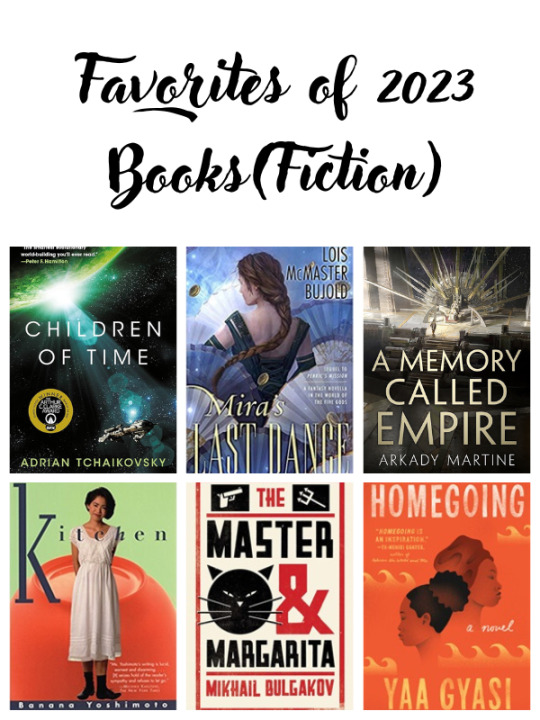

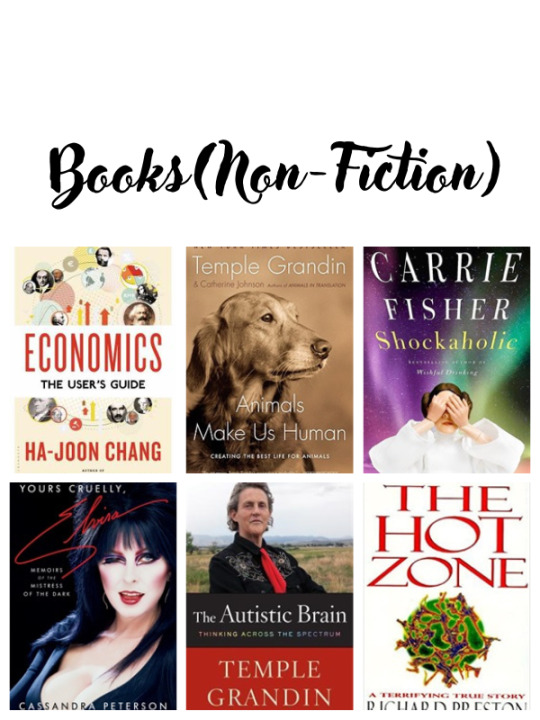
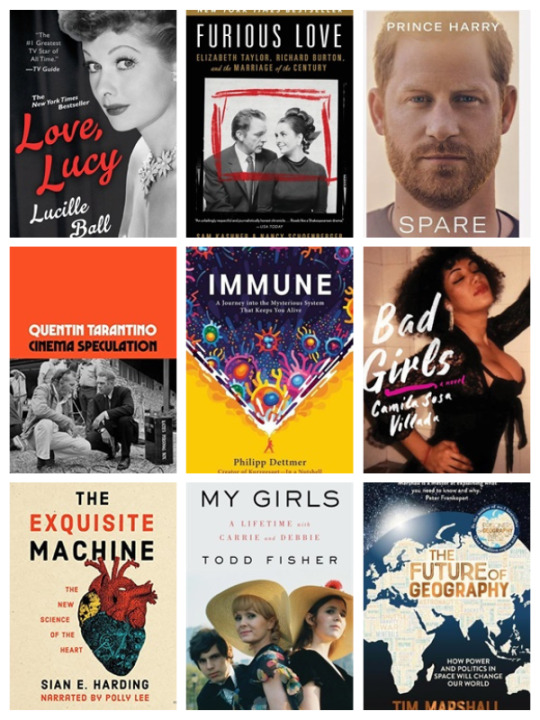
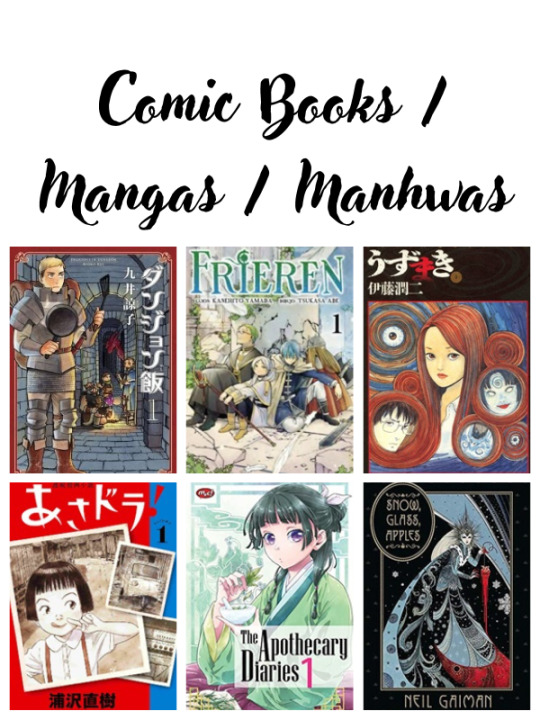
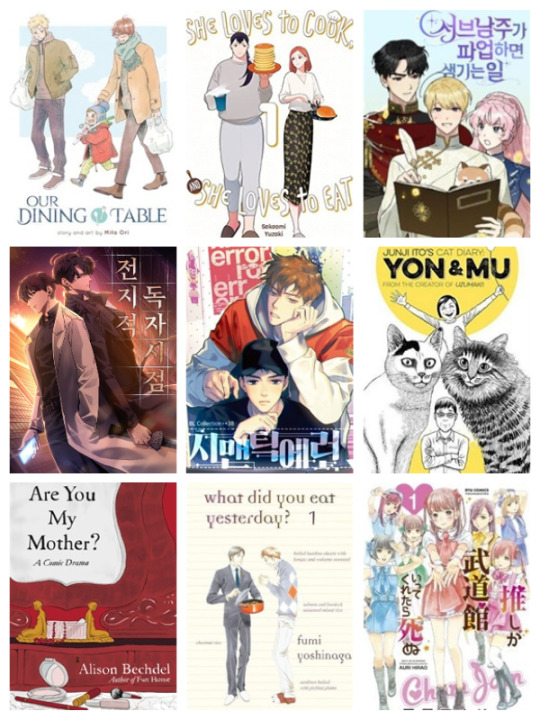






My Personal Favorites of 2023
Books - Fiction
Children of Time Series (Adrian Tchaikovsky)
Penric & Desdemona Series (Lois McMaster Bujold)
Teixcalaan Series (Arkady Martine)
Kitchen (Banana Yoshimoto)
The Master and Margarita (Mikhail Bulgakov)
Homegoing (Yaa Gyasi)
One Day All This Will Be Yours (Adrian Tchaikovsky)
Shards of Honor (Lois McMaster Bujold)
Elder Race (Adrian Tchaikovsky)
Bryony and Roses (T. Kingfisher)
Ogres (Adrian Tchaikovsky)
The Blue Castle (L. M. Montgomery)
Bambi (Felix Selten)
System Collapse (Martha Wells)
Lost in The Moment and Found (Seanan McGuire)
Books - Non-fiction
Economics: The User’s Guide (Ha-Joon Chang)
Animals Make Us Human (Temple Grandin)
Shockaholic (Carrie Fisher)
Yours Cruelly (Cassandra Peterson)
The Autistic Brain (Temple Grandin)
The Hot Zone (Richard Preston)
Love, Lucy (Lucille Ball)
Furious Love (Sam Kashner and Nancy Schoenberger)
Spare (Prince Harry)
Cinema Speculation (Quentin Tarantino)
Immune (Phillip Dettmer)
Bad Girls (Camila Sosa Villada)
The Exquisite Machine (Sian E. Harding)
My Girls (Todd Fisher)
The Future of Geography (Tim Marshall)
Comics/Manga/Manhwa
Dungeon Meshi
Sousou no Frieren
Uzumaki
Asadora
The Apothecary Diaries
Snow, Glass, Apples
Bokura no Shokutaku
She Loves to Eat, She Loves to Cook
What Happens When The Third Wheel Goes on Strike
Omniscient Reader’s Viewpoint
Semantic Error
Junji Ito’s Cat Diary: Yon and Mu
Are you my Mother?
What did you eat yesterday?
Oshi Ga Budoukan Ittekuretara Shinu
Movies
Dog Day Afternoon
The Three Faces of Eve
The Lion in Winter
Pride
Leave her to Heaven
Ladyhawke
Catherine Called Birdy
Kiss of The Spider Woman
God’s Own Country
The Crying Game
A Knight’s Tale
The Company of Wolves
Dungeons and Dragons : Honor Among Thieves
The Joy Luck Club
Bottoms
Tv Shows (Liveaction)
Yellowjackets - S02
Bokura no Shokutaku - S01
This Country - S01-S03
She Loves to Cook, She Loves to eat - S01
What we do in the shadows - S05
Peacemaker - S01
Oshi Ga Budoukan Ittekuretara Shinu - S01
Taskmaster AU - S01
Class of ‘07 - S01
Good Omens - S02
Barry - S04
Succession - S04
Ghosts US - S02
From - S01-02
Our Flag Means Death - S02
Tv Shows (Animation)
Star Trek: Lower Decks - S01-S04
The Apothecary Diaries - S01
Fionna and Cake - S01
Sousou no Frieren - S01
Oshi no Ko - S01
My Adventures with Superman - S01
Solar Opposites - S04
Kaguya Sama : Love is War - S01-02
Undone - S01-S02
Bob’s Burgers - S13-S14
Skip to Loafer - S01
My New Boss is Goofy - S01
Tondemo Skill - S01
The Great North - S03
Futurama - S11
2022
17 notes
·
View notes
Text

Maria Mikhailovna Kurenko. The forgotten name of the Russian singer.
Nowadays this name doesn't mean much to music lovers.However, in the early 20s of the last century, a reviewer for one of the Kyiv newspapers wrote: “The singer is the best coloratura soprano in Russia. "Nothing is impossible for her, neither technically nor vocally. She sings as easily as she breathes." “Without a doubt, among coloratura sopranos she is a star of the first magnitude.” In 1913, Maria Kurenko graduated from the Moscow Conservatory in solo singing under the famous teacher Umberto Masetti. Soon she made her debut on the stage of the Kharkov Opera in the role of Antonida in Glinka’s opera Ivan Susanin. Then Maria Mikhailovna was a soloist at the Kyiv Opera, and at the turn of the 1910s and 20s she sang at the Bolshoi Theatere and in the famous troupe of Sergei Zimin.
Unfortunately, the singer's artistic career in Soviet Russia was short-lived.In 1923, Kurenko received an invitation from Latvia, and for two seasons she performed there with great success in performances and concerts.Three years later, she went on a grand tour of Europe, after which she was invited to America. Kurenko's very first performance in Los Angeles in the role of Gilda brought the artist stunning success. “The performance of the singer Maria Kurenko, who is completely unknown to our public, was a triumph,” noted the critic for the Daily Times. The singer's popularity in the USA grew very quickly. She performed in the best opera houses, with first-class orchestras, wonderful conductors, and outstanding singers.She was one of a few artists honored to perform at the White House at the invitation of President Roosevelt. Kurenko had creative friendships with many musicians who found themselves in the United States.She was considered the most authoritative interpreter of Igor Stravinsky's vocal works. In the early 1930s, Alexander Grechaninov recorded twelve of his romances with her on gramophone records. Among the admirers of the singer's talent was Sergei Rachmaninov, who considered Maria Mikhailovna to be perhaps the best performer of his romances. Kurenko's chamber concert programs always included works by Russian composers - Glinka, Dargomyzhsky, Balakirev, Tchaikovsky, Rimsky-Korsakov. She performed Mussorgsky's songs magnificently, which were almost never performed at that time.
#classical music#opera#music history#bel canto#composer#classical composer#aria#classical studies#maestro#chest voice#Maria Kurenko#lyric coloratura soprano#lyric soprano#coloratura soprano#soprano#classical musician#classical musicians#classical history#opera history#history of music#history#historian of music#muscian#musicians#diva#prima donna
5 notes
·
View notes
Text
That Playlist, Explained

The main focus of this playlist is to function as some sort of soundtrack for the cricket tournament on Weston’s arc. I’m not entirely sure how much the songs are historically accurate (aka “was this composition bopping in the local victorian theaters of that time (1889)?”) but let’s work with what we have: my passion for classical music.
Now my initial expectation was writing down the compositions names and writing what was my plan by choosing them… and somewhere after Pomp and Circumstance I had completely lost the plot and just begun narrating/summarizing the chapters. But the actual meanings are at the end if you want to skip it!
★ [Spoilers for the end of the arc!!] ★
1. Giselle: Act I - Entrée du Prince (Prince’s Entrance), by Adolphe Charles Adam [1841]
We open with the “Prince’s Entrance” at the ceremony of June 3rd in Weston, where the house representatives are yet to be presented. This is our little intro before the great show!
2. Pomp and Circumstance: March No.1, by Edward Elgar [1901]
Now enter the houses and their teams!
“Their overwhelming physical prowess and teamwork are second to none… absolute champions! Top of the World: the Green Lions, the Knights!”
“Captivating spectators with their elegant plays… a garden of fine plays! Brilliant Eden: the Scarlet Foxes, the Dramaturges!”
“The House team, they say, throw their opponents into confusion by unpredictably tricky plays… a swarming of specters! Ghost Legion: the Violet Wolves, the Monk Sages!”
“They aim for an opportunity to win the championship with their strategic game plans… attack of the cornered rats! God-Only-Knows: the Sapphire Owls, the Academics!”
So come and enjoy for the ceremony of the Inter-house Cricket Tournament of 1889 is at the heights of its fire.
3. The Planets, Op. 32: 4. Jupiter - the Bringer of Jollity, by Gustav Holst [1914]
The first game is Sapphire Owls vs Scarlet Foxes. It’s epic, it’s joyful and we’re off to an impressive start with Soma’s cricket abilities, Edgar’s ~Crimson Rose Tornado!~ and Harcourt being himself.
The game is impressive and it seems like everything is going in favor for the Scarlet Fox house…
4. The Four Seasons: Winter, by Antonio Vivaldi [1723]
… until it wasn’t. With a chilling sensation that creeps even the most sensible regions of one’s stomach, Bard’s horrendous meat-pie and Ciel’s plan dominate the game and guarantee the first victory for the Sapphire Owls!
5. Swan Lake: Act III - Spanish Dance, by Pyotr Illych Tchaikovsky [1877]
Going to the other side of the campus, a match between the Green Lions and the Purple Wolves. Cheslock makes a great move with his Rushing Violet Vapour — Purple Burnout!! and it’s highly effective until Herman hits it back. Victory to the Green house! And the cherry on top is… whatever the hell Gregory is doing on the field. Art goth kids, I swear to God…
6. Sun and Earth: Scene IV - “Winter” Polka, by Josef Bayer [1888]
Ciel gives his team a motivational speech: “Let’s win this! For us and for the Red House too!” (oh my, what a gentle boy!).
Now it’s official: the finale, Lions against Owls! But that will take a little while, so rest yourself and enjoy the show!
7. Radetzky March, by Johann Strauss I [1848]
Sebas… I mean, Master Michaelis puts his cheering orchestra in place to cheer for the Owls. And things seem to be going pretty well for the Owls, as they manage to hit the ball and mark the first points. There’s a flashback of Ciel explaining their strategy: every strong chord from the march, it’s a cue for the ball that’s coming!
8. L’Arlésienne Suite - No.2: 4. Farandole, by Georges Bizet [1872]
Here comes Edward for the bowl! He applied Cheslock’s move (Rushing Violet Vapour — Purple Burnout!!) and made a hit. And also cuts to Edward’s life flashback~ He doesn’t hold back, he doesn’t lose hope! Edward puts effort in everything he can do to come a little close to the geniuses he admires — even if Herman recognizes that this is no mid Midford on the field…!!
9. Concerto For 2 Violins in A Minor, L’estro Armonico: I. Allegro, by Antonio Vivaldi [1711]
And on the other side of the field, enter the Headmaster and exits Sebastian from the orchestra. But unfortunately this left the Blue House in a bad spot without its musical cues and “cheering”... that’s it until Ciel makes up a new strategy! Now there’s something wrong with the Green House players — hm, and we’re informed that Sebastian thought it would be a good idea to invite Lau?
10. The Nutcracker: VI. Chinese Dance, by Pyotr Illych Tchaikovsky [1892]
Oh. So that’s why. A Surprise Brazen Harem of Woman!! — Ciel, or rather, Lau’s move for the Blue House. And the poor owl boys and their even poorer eyesight don’t even have a clue on what’s going on. That’s it… until Maurice raised a cry about their strategy. Time for a new plan, Ciel!
11. La Campanella, by Niccolò Paganini [1838]
And Sebastian is still desperately trying to find the running Headmaster!
While at that, a flashback reveals Ciel had news instructions for the Owls team. In a complex physics dynamic that’s too complicated to be summarized here (without copying a whole paragraph from the manga, that is), Lawrence makes a hit. You can see all Blue House players from here, in a new move: The Sword in the Stone~!!
12. Dance of the Goblins, by Antonio Bazzini [1852]
Now it’s Ciel’s time to bowl again — and Sebastian is on the search. And Ciel’s ball trajectory is… well, physically questionable against all laws of nature… but it’s within the rules, so shut up.
13. Pictures at an Exhibition: The Great Gate at Kiev, by Modest Mussorgsky [1874]
The field complains about the foul nature of this move but Herman comes to the Blue House’s defense: “for the owl has come with might and main to hunt the lion”! (in his words)
14. 1812 Overture, by Pyotr Illych Tchaikovsky [1880]
But Ciel’s trick is still troublesome for a lot of Green House players, in a matter of mind manipulation and Over-the-Edge Tactics!! Devilish, indeed. Terrific, also. Now is Edward on the bat and he managed to make a six — now it’s on Lawrence’s hands.
And later is in the… air? BUT NO! The ball has fallen directly into the wicket?! So Lawrence was literally up to something! — the field crowd melts at the sight. It’s the ~Hunter in the Dark~~!, sneaky and deadly as an owl. Now enters Herman in all his glory and preparation. Brain vs Brawn, afterall! The discussion of generations of human genes!
Lawrence throws but Herman takes the hit epicly, to the point of throwing it back so hard it could have BLOODY DESTROYED someone’s head in the crowd. That’s: Sword Excalibur!!
At last, Ciel gives a pep talk to Lawrence to regain his confidence in himself and the game for the Blue House. Winning or losing… may he bowl without any regrets.
(pls put on 9:40 from here)
In another epic set of panels — that’s it, scenes — Lawrence bowls one more time… but oh no, Herman accidentally hits Ciel while preparing to bat. As other Green House player comes to the field, Ciel seizes his eye on the ball and ends up throwing it right into the wicket! Umpire and it’s out!
The match is over: VICTORY to the Blue House! (put music on 12:30)
As if imaginary canons blow their shots into the distance, every single student on the field comes together to jump Ciel onto their shoulders. Finally, after so much effort and time, the Sapphire Miracle happens yet again! And by the hands of a second generation of Phantomhive? Incredible! One hell of a winning match!
And here comes Master Michaelis to rescue a wounded Ciel from his team’s hands to receive treatment. But the boy is the most happy about his house winning and finally being recognized as capable as anyone else. So sweet, this little boy! An absolute angel in disguise had come for the Blue House’s cause…!!
15. Devil’s Trill: III. Allegro assai, by Giuseppe Tartini [1713~1740]
… well, that was the expectation.
Sebastian treats Ciel’s wound while a little bit of explanation unfolds. They really said “fake it until you make it”, all in good faith for the wellness of their investigation. Remarkable? Remarkable. Still in this moment of calmness before the party — and then, a storm — they discuss some important things.
16. Die Entführung aus dem Serail: Act 3. “Bassa Selim lebe lange”, by Wolfgang Amadeus Mozart [1782]
I guess you can see them now, the “Little-Lord Cox” and the boat with his teammates, sailing through the Thames river in front of Windsor Castle, while good ol’ Vicky watches the English youth bestowing another glory to the country’s name… and maybe falling straight into the water can be a good sign? It is the most elegant display of nerdy behavior if I say myself — I would probably get the same ending.
So may the festivities begin!
17. In the Dark of the Night (Epic Version), by Alala
Oh. What is this? Perhaps… do I hear a twist coming up? About the Headmaster? About the P4? Or maybe, there’s someone else behind in the darkness? Well, this is talk for another day. Don’t take yourself too seriously. You’re so under bloody pressure, mate!
★★★★★
Now, here, what the compositions are meant to be:
1. Giselle: Act I - Entrée du Prince (Prince’s Entrance), by Adolphe Charles Adam [1841]
Due to the regal and pompous status of Weston College, I thought using Giselle’s Prince Entrance would go very well as an intro.
2. Pomp and Circumstance: March No.1, by Edward Elgar [1901]
Pomp and Circumstance is a solemn and popular British march known throughout the whole world, especially for their movements. I thought it was only fitting that the houses would enter at such timing.
But it’s not historically accurate!
3. The Planets, Op. 32: 4. Jupiter - the Bringer of Jollity, by Gustav Holst [1914]
Holst’s Jupiter had this Scarlet Fox feel to it that I couldn’t simply ignore, so here we are! But it’s not historically accurate either!
The Four Seasons: Winter, by Antonio Vivaldi [1723]
Technically this was meant to symbolize the Purple House but as I was reading and it became that whole debacle about Bard’s pie, I thought Winter’s ominous sound would go better with it lol
Swan Lake: Act III - Spanish Dance, by Pyotr Illych Tchaikovsky [1877]
And this one is now symbolizing Purple House’s game. I wish we saw more of them…
Sun and Earth: Scene IV - “Winter” Polka, by Josef Bayer [1888]
Not a big meaning for this one. I think it was in my spotify favorites list and it sounded nice. Also it’s funny to think it comes before the main story lol
Radetzky March, by Johann Strauss I [1848]
This one actually appears in the manga/anime!
L’Arlésienne Suite - No.2: 4. Farandole, by Georges Bizet [1872]
I don’t understand much of Bizet but this also sounded nice and proper for this scene.
Concerto For 2 Violins in A Minor, L’estro Armonico: I. Allegro, by Antonio Vivaldi [1711]
Also no big plan for this one but it’s a nice intermission for the next big thing that’s about to happen.
The Nutcracker: VI. Chinese Dance, by Pyotr Illych Tchaikovsky [1892]
C’mon. Like… c’mon. Someone had to. With this context?? Obvious disclaimer that this isn’t actual Chinese instrumentalization or music. Funny enough, it’s a couple of years “futuristic” for the story, so also not accurate.
La Campanella, by Niccolò Paganini [1838]
I like La Campanella and it goes amazing with this scene.
But also, there were rumors at Paganini’s time that he had made a pact with the devil for his violin skills. Although it is theorized that probably his “mephistopheles-like” appearance and long fingers may be results of Marfan syndrome or Ehlers–Danlos syndrome — also a complicated lifestyle as a musician.
Dance of the Goblins, by Antonio Bazzini [1852]
I never heard of this one before but as I was listening (and obviously looking at the title), I thought it would fit perfectly with this situation. After all, if Sebastian is a hell of a butler, Ciel is one boy of a goblin.
Pictures at an Exhibition: The Great Gate at Kiev, by Modest Mussorgsky [1874]
Mussorgsky is very grandiose in his compositions, especially in the Pictures at an Exhibition, so I thought it fit Herman’s speech.
1812 Overture, by Pyotr Illych Tchaikovsky [1880]
This is a known battle overture with literal cannons with it and it screamed “that last part at Owls vs Lions game” with all its chaos, violence, epicness and victory at the end.
Devil’s Trill: III. Allegro assai, by Giuseppe Tartini [1713~1740]
It’s… almost self-explanatory by the title. But for those who don’t know, Tartini had a nightmare/dream once that the actual devil showed up to his, in his bed, to simply play the violin and made the most complicated, devilish-structured but perfect music on the instrument. Tartini spent the rest of his days trying to replicate the sound of his dream, “without success” in his words.
Die Entführung aus dem Serail: Act 3. “Bassa Selim lebe lange”, by Wolfgang Amadeus Mozart [1782]
It came like a nice addition since the next major arc, the Emerald Witch, is in Germany. Plus, it’s one of my favorite Mozart’s songs from the Amadeus movie — alongside Symphony 45 Allegro, Dies Irae and Confutatis.
17. In the Dark of the Night (Epic Version), by Alala
No, think of another slender, sinister and bony-like guy we have seen before…
#kuroshitsuji#black butler#sebastian michaelis#ciel phantomhive#o!ciel#edgar redmond#lawrence bluewer#herman greenhill#gregory violet#kuroshitsuji playlist#black butler public school arc#black butler season 4#kuroshitsuji season 4#kuroshitsuji weston arc#black butler weston arc#weston college arc#weston arc
19 notes
·
View notes
Text
It´s more of a questionnaire than interview and it´s under the cut :-)
Penelope Wilton: ‘I was dyslexic. People thought I was stupid’
The actress on flower power, the Beatles and her star turn in Downton Abbey
First film I saw at the cinema
My mother used the cinema as her nanny. She had an arrangement with the usherette where she would go shopping and leave my sister and me at the cinema. When she had finished shopping she would come down the aisle and wave a white hanky — that was our sign to leave. Les Vacances de Monsieur Hulot was the first film I remember seeing. Jacques Tati was such a great clown.
First time I cried at the cinema
I don’t tend to cry over films. Usually I cry in front of paintings or at concerts. I did, however, sob through the film Brief Encounter. It’s so terribly touching. I still get a lump in my throat every time I watch it.
First time I performed on a stage
My first job was at 20, as Tammy the tightrope walker in a Christmas show at the Nottingham Playhouse. Theatre is always anxious-making and it gets worse when you’re older. There have been some funny things happening while I’ve been on stage, though. One audience member heckled Ralph Richardson and me over bad language during the play West of Suez when we performed in Brighton. Another acclaimed actor, who will remain nameless, was embarrassingly drunk on the stage once, forcing me to say his lines and mine. It was madness.
First TV show I watched
We didn’t have a television for a long time while I was a child. I think we had one for the coronation but then it seemed to go. It wasn’t until I was a bit older that I became aware of television, and even now I don’t seem to have much time to watch things, mainly because I’m busy acting in plays and TV shows like Downton Abbey, which was a wonderful experience. It was a surprise to us all, including the writer Julian Fellowes, that it was so successful here and everywhere. It was particularly lovely to work with Maggie Smith because she was one of the actors I had always admired. I would be very keen to come back to the show if it were to return. I can hardly leave it now.
First book I loved
I was dyslexic as a child, at a time when dyslexia wasn’t diagnosed. You didn’t get much help — people just thought you were stupid. My dyslexia seems to have got better with age, but when I was younger I was read to by my mother and my older sister rather than reading myself. The Wind in the Willows by Kenneth Grahame was a favourite.
First album I bought
Please Please Me by the Beatles. Growing up I listened to romantic music like Dionne Warwick on the radiogram in our sitting room. Nowadays I listen to more classical music, but I still have a soft spot for the Beatles. Sadly I lost that LP when we moved houses.
First concert I attended
The 1812 Overture by Tchaikovsky at the Royal Albert Hall when I was about ten. They had real cannons that went off. I only started going to concerts when I was older. My late husband, the [Roads to Freedom] actor Daniel Massey, was a great classical music fan. He taught me a lot about music, in particular jazz and Erroll Garner.
First pop-inspired fashion trends I adopted
Hotpants and thigh-length boots in bright pink suede. Once you went to drama school, you didn’t have any money and could do what you wanted looks-wise. It was all flower power then, so we would walk around with no shoes on, throwing flowers at each other. It was alternative but lovely.
First actor I admired
Michael Redgrave. I saw him give the most tremendous performance in Uncle Vanya at Chichester in 1963 when I was 17. Laurence Olivier was the Doctor. Together they were funny and heartbreaking. Redgrave was a wonderful actor and, more importantly, a wonderful man.
First moment I realised I wanted to be an actress
I went to a pantomime once and there was a whoosh and the curtain went up. There was this bright light and warm air came out. I thought, “I don’t know why I’m sitting in the dark here. I’d like to be up there.”
First famous person I met
Jonathan Miller when he came to Nottingham Playhouse to direct King Lear. I was a bit starstruck then, but meeting the royal family is the only time I get truly anxious.
First moment I realised I’d made it
Even at my age I don’t think I have. If you started, you wouldn’t be very good. So I will continue to try.
13 notes
·
View notes
Text

“When I thought of Jeremy and his talk about 'higher men' I wanted to laugh out loud. The life of the spirit was all very well—and Bach and Delius and Schopenhauer had been an incomparable enrichment to the world—but it was never supposed to be kept separate from the life of the body. Music and philosophy were like wine—they were intended to enhance the pleasure of being alive, not to replace it: What surprised me most was that I had starved my humanity for as long as I could remember, feeding it on a diet of ideas and mathematics—and yet I had not starved it to death, for here it was, as healthy as ever, revelling in the thought of Patricia's damp hand. The truth suddenly seemed very simple; life was supposed to be many-sided, and the happiest human being is he who succeeds in perceiving as many sides as possible. I had spent my whole life living with an error—that life is supposed to be dominated by one truth; and it had worried me that life has an aspect of violence as well as of order and reason. But the truth is that life has hundreds of aspects, and every philosophy represents only one of them.
And it was at that moment that I had my great idea; I still believe it is the most important idea that has ever come to me. If I thought about it for the next fifty years, I should not become aware of all its implications.
It was this. We take it for granted that a man can adjust his intellectual viewpoint as easily as he can adjust the range on a telescope. One day he can agree with Schopenhauer that the world is a death-trap and that the most sensible thing would be suicide, and the next day agree with Dr Pangloss that everything is for the best in this best of all possible worlds. He can take any one of a thousand points of view about life, from optimism to total pessimism. He can take up a dozen books in succession, from The Fifth Form at St Dominic's to The Brothers Karamazov, and see the world through the eyes of each author. We all take these intellectual quick-change acts for granted.
Why, in that case, does man accept his emotional states as somehow unchangeable? A man gets up early in the morning in a state of nervous tension, and feels depressed at the prospect of having to live through another day. Then he goes outside; it is a spring morning and the sun comes out; immediately he feels cheerful. His emotional climate has altered in a few seconds, yet he accepts this as a kind of natural accident, like the sun coming out—something beyond his control.
Admittedly, man knows a little about altering his emotions. If he likes music, then he will play a Tchaikovsky symphony when he feels a need for romantic emotion, Chopin when he feels melancholy, Wagner when he wants heroics, and so on. But he is still submitting himself to new experiences to change his emotions; he never asks himself why he should not have as much control over his emotions as over his ideas.
When I read what I have just written, I see that I have still not conveyed my central idea. Because I am not talking about mere emotional changes—from sadness to happiness, for example. We do not spend most of our lives in states of gloom or optimism or pity or excitement; we spend them in a state of emotional constipation—feeling nothing, or very little indeed. That is why the people in our office lived in such a state of dullness. They accepted this; they waited patiently for destiny to present them with some state of happiness or excitement. It never struck them that this state of emotional constipation was thoroughly unnatural—as unnatural as physical constipation.
It seemed to me that a person should be able to wake up and say: Now, how shall I feel this morning? Shall I wear my Tchaikovsky mood? Or my Bach mood? Or perhaps my Beethoven mood?' Obviously, certain moods would be unsuitable for a morning spent adding up figures, or doing the spring cleaning, or attending a parents' meeting at the school, just as a fur coat would be the wrong garment for a summer's day. If I woke up on a cold morning and found myself wearing a swimsuit, I would not feel bound to go to work in it. And yet we feel bound to accept the mood in which we wake up in the morning—or the complete lack of mood, which is more usual.
These ideas came to me as I sat in front of the fire, reading Vinogradoff; I still have the copy of Vinogradoff with the clean pages at the end (intended for calculations) covered with my handwriting. When I had written these ideas down, I remembered that I had promised to see Gerald Sutton, so I walked over. It was a clear cold night, and I looked at the sky and thought: Man is static because he has no reason to be anything else. No one teaches him any differently. Zoologists tell us that an animal takes three times as long to learn how to behave if it has no mother. Well, man has no mother and father; he is completely alone. One god, one god-like human being, would change the course of history by showing men how to behave . . . . ” - Colin Wilson, ‘The Violent World of Hugh Greene’ (1963) [p. 133 - 135]
#wilson#colin wilson#violence#hugh greene#emotions#truth#philosophy#literature#existentialism#mishima#yukio mishima#ubermensch#übermensch#nietzsche
6 notes
·
View notes
Text
A Book Question
So, I've been hearing about how good Adrian Tchaikovsky's books are for sometime, and a couple months back, I got Empire in Black and Gold out m'local library and I loved it, and reserved a copy of Dragonfly Falling. It's taken until now for it to get into my hands, and in this time I have discovered that, rather than trilogy I assumed, there are actually 14 books!
This is not a bad thing, except, I need to know. the first book has Our Heroes barely eking out a bittersweet W at great cost, that it is implied isn't really an L for the bad guys. Is every book like that up until the end?
10 notes
·
View notes
Text
🐍 don't want none unless you got 🐇 by Lisa_Telramor
Awwww so cute! Loved the relationship build-up ❤️
Also JC, NH and WN perfect supporting characters!
Quotes:
“It’d be nice if people remembered that the world doesn’t end with Beethoven and Tchaikovsky, right?” Wei Ying said.
“Mm.” Lan Zhan’s scowl softened slightly. For a second he almost looked like he tolerated Wei Ying’s presence. And then the moment passed and he was back to frowning in Wei Ying’s direction.
Lovely.
“Choose one of the composers by Friday,” Lan Zhan said. “Then we can meet here on Saturday to decide on a piece of music and perhaps start learning it.”
“That works I guess.” He still wasn’t happy with the whole setup, but since Lan Zhan didn’t look like he’d back down and let Wei Ying chip in more, Wei Ying could at least try to hold up his end of things. Maybe if he did a good job, Lan Zhan would stop looking at him like he committed some kind of crime in front of him. “What time, or maybe give me your cell phone number?”
“Nine,” Lan Zhan said.
Okay. No number. “Nine at night?”
“Nine in the morning.”
“On a Saturday?” Wei Ying asked, aghast.
“Is that a problem?” Lan Zhan asked coldly, like if it was a problem, he’d make a worse one.
————
And speaking of group projects, he was fairly certain the current one was punishment by the unfeeling universe for some incidental sleight. His partner was brash, loud, sloppy, and apparently a hater of rabbits. That last item made him an enemy by default.
Unfortunately, Wei Ying didn’t seem to be picking up on Lan Zhan’s animosity, because he greeted Lan Zhan with a grin and a wave when they met up to continue their work on the project.
“Lan Zhan!” Wei Ying said too loudly, a bounce in his step. “Hey, how’s your week going? Did you do well on the quiz? I’m surprised I didn’t miss any questions since I kind of had to skim the reading…”
Another strike. If Wei Ying couldn’t bother to do required readings, Lan Zhan didn’t hold much hope in him being actually useful for the report. Well, Lan Zhan was intending to do the bulk of the work regardless. So long as Wei Ying could speak on their topic for the presentation and play whichever piece of music he chose, Lan Zhan would be satisfied.
T, 19k
Summary:
Wei Ying wanted to make a great first impression on the Hot Library Guy when they got assigned a project together. Unfortunately, Lan Zhan missed the innuendo of Wei Ying's shirt entirely.
#wangxian#wei wuxian#wei ying#lan wangji#lan zhan#the untamed fic#wangxian fic rec#the untamed fanfiction#untamed fic#mdzs fic#multiple povs
19 notes
·
View notes
Text

Round 2 is here!
Order of things will be similar to Round 1: one group (A, B, C, D) will be posted per day, starting with Group A. Polls will run for a week. Once all polls for a round close, polls for the following round will begin posting within 24-48 hours (depending on mod availability). You may send in asks with “propaganda” if you wish.
We had one tie in round one, so both shows will advance to Round 2 and this will be a 3-way poll.
Round 2 matches below the cut:
GROUP A
Ekaterina: The Rise of Catherin the Great | Ekaterina (2014) vs. Tchaikovsky's wife | Zhena Chaikovskogo (2022)
The Duelist | Duelyant (2016) vs. Catherine the Great | Velikaya (2015)
Detective Anna | Anna – detectiv (2016) vs. Bloody Lady | Krovavaya Barinya (2018)
Star of Captivating Happiness | Zvezda plenitelnogo schastya (1975) vs. Russian Ark | Russkiy kovcheg (2002)
GROUP B
The Silver Skates | Serebryanyy konki (2020) vs. Bezsonov (2019)
The Fall of the Empire | Gibel imperii (2005) vs. Matilda (2017)
The Road To Calvary | Hozhdenie po mukam (2017) vs. Admiral (2008)
Morphine | Morphiy (2008) vs. Battalion | Batalyon (2015) vs. Rasputin | Grigoriy R (2014)
GROUP C
War and Peace | Voyna I mir (1966) vs. A Hero of Our Time | Geroy nashego vremeni (2006)
Eugene Onegin | Yevgeny Onegin (1959) vs. Gogol (2017)
Anna Karenina: Vronsky’s Story | Anna Karenina. Istoriya Vronskogo (2017) vs. Crime and Punishment | Prestuplenie i nakazanie (2007)
Fathers and Sons | Ottsy i deti (2008) vs. Two Women | Dve zhenshchiny (2014)
GROUP D
Sophia (2016) vs. Alexander: The Neva Battle | Aleksandr. Nevskaya bitva (2008)
Iron Lord | Yaroslav: Tysyachu let nazad (2010) vs. The Terrible | Groznyy (2020)
Godunov (2018) vs. Golden Horde | Zolotaya Orda (2018)
Secrets of the Palace Revolutions | Tayny dvortsovykh perevorotov (2000) vs. Elizabeth | Elizaveta (2022)
#russian period dramas bracket#period dramas#tumblr bracket#polls#tumblr polls#russian period dramas#round 2
5 notes
·
View notes
Text
This playlist is an humble suggestion following the logic one chapter equals one track.
I deliberately have chosen:
- classic music because Dimitrescu's castle screams this style
- instrumental or softer versions of pop/rock songs as Lady Beneviento doesn't like to speak or be flooded by words.
Regarding the instruments, I can't help but associate Donna with strings since I'm convinced there are no better instruments to express grieve. Naturally, Bela is symbolised by the piano.
Lastly, I didn't want to duplicate the playlist from the fanfiction The Great Morel Garden by Fitzeroy_McCandless. I can only advise you to read it and listen to the available playlist. Some songs are so on point!
As always, I'm open to suggestions and critics ^^
Chapter 1: Hide and survive
Moonlight Sonata - Lola & Hauser
This iconic sonata composed by Ludwig van Beethoven is often associated with a sense of longing and introspection. I believe those are the perfect subjects for Donna's introduction. With this version, the two main instruments are present.
Chapter 2: Look at me
Montagues and Capulets - Sergei Prokofiev, Richard Clayderman, Bulgarian Symphony Orchestra, Deyan Pavlov
The music initially composed by Prokofiev creates a sense of tension and pursuit. It sounds to me like a hazardous waltz. The rivalry atmosphere is a reference to the sisters' show of force and the dance is, of course, the little game where Donna try to keep Bela at bay. This version has a softer second phase with the addition of the piano so it can represent Bela's first appearance in Donna's life.
Chapter 3: Don’t worry, your secret is safe with me
Running Up That Hill (Piano Arrangement) - Pianella Piano
A classic pop song this time! Switching to Bela's POV so I have chosen a piano version. Neither her nor Donna understand the ins and outs of each other lifestyle. I don't believe Bela wants to swap their positions, she is not this desperate at this point, but she definitely wish to better understand Lady Beneviento.
Chapter 4: Enter
Swan Lake - Pyotr Ilyich Tchaikovsky
This chapter is quite dramatic: finding traitors in castle Dimitrescu, Cassandra's reaction, Bela handling the public massacre, Bela discovering Donna's portait, Bela being a victim of Lady Beneviento's pollen and her recovery. I believe we can hear the building in this music and the dramatic swells that foretell Bela's fight in the cold and future handicap while keeping a romantic undertone.
Chapter 5: What do you want from me?
Breathe Me - Sia
How about a sad, orchestral ballad about struggling and needing a friend for comfort? I believe it's perfect for this chapter.
Chapter 6: I can't wait to see you
Je te laisserai des mots (Instrumental) - Daniella Vega
Originally by Patrick Watson, the song is about writing and leaving letters to a dear one while not pressuring the receiver. It suits the Bela and Donna's epistolary relationship flawlessly. This music has a special place in my heart...
Chapter 7: Table for two?
Le Festin - Dao Pham
Inspired by the Pixar and Disney movie Ratatouille, I love the cosy and relaxing ambiance from this version. This first cooking session followed by the shared meal is their first homelike moment! I hesitated with a bossanova or a tarantella song but I found them too high-spirited for our favourite couple and the introduction of Donna's demons.
Chapter 8: Would you like to lead?
Danse macabre - Camille Saint-Saëns, Slovak Radio Symphony Orchestra, Keith Clark
Not particularly original, I concede. However it was impossible not to associate this emblematic piece of art with the masked ball at castle Dimitrescu.
Chapter 9: I do
Kiss From a Rose - Vitamin String Quartet
A rather mysterious song that remains unexplained by the singer-songwriter Seal. I suppose the interpretation is quite free in this case... The rose is, of course, a reference to Bela and the strings could express Donna's relief to be accepted. Overall, I support the idea of Bela lightning Donna's grey world.
Chapter 10: A woman and not a female monster
Dies Irae - Giuseppe Verdi, Carmen Giannattasio, Veronica Simeoni, Alxander Timchenko, Carlo Colombara, Yuri Temirkanov, St. Petersburg Philharmonic Orchestra
I know, so much the drama! I wanted to emphasise on ghosts (choristers) terrorising Donna and wrath building in Bela. The explosion is a reference to Bela's assaults. All the ingredients are here for a fated disaster.
Chapter 11: How dare he?!
Dragon days - Vitamin String Quartet
Alicia Keys originally compares a castle resident longing for a certain someone to being trapped in a dungeon. Something is in her way to pursue the relationship she wishes for, alas, she can't act and she can only wait. This topic can be applied to Bela and Donna in this chapter. I was looking for a piano version as it's Bela's POV (the dragon pun!) in the majority but this string version is too beautiful to not be selected.
Chapter 12: For Bela!
Somewhere Only We Know - Vitamin String Quartet
Once again, it's an alternative version by Vitamin String Quartet. Keane lead vocalist Tim Rice-Oxley revealed in 2004 that the song is about being able to draw strength from a place or experience you've shared with someone. I think the idea is perfectly in adequacy with Donna's new will to fight her demons in hope to become respectable once again.
Chapter 13: I trust you
Toccata and Fugue in D Minor (Epic Version) - Johann Sebastian Bach, L'Orchestra Cinematique, Alala
Bach offers a fabulous piece with a dark and ominous tone. The menacing tone is accentuated with the percussion instruments in this version. I need a grandiose music for Lady Dimitrescu and her confrontation with Donna.
Chapter 14: You don’t need to hide
Spectrum - Florence + The Machine
It was impossible to not add a Florence + The Machine song as I think her unique universe in Ceremonials match perfectly with the ambiance I wish to write about. I wanted to show that the beladonna releationship reached the level when they both are confortable with the presence of each other even if not announced / invited. How Bela, and her family by extension, changed Donna’s quotidian and illuminated the gloomy manner as soon as they put a step in.
Chapter 15: Cara mia
Delicate - Roma Symphony Orchestra
My favourite song (for the moment) by Taylor Swift. The protagonists want desperately to not offend their new love interest. They need to be sure that nothing they do scare the other away. Bela and Donna, like any lover, fear of doing something wrong, being too much or not enough at the same time. This version is slower so it fits the slow burn dimension.
Chapter 16: Don’t leave...
Don't Speak - Midnite String Quartet
Another alternative version by Midnite String Quartet. A heartbreaking song by No Doubt that I think it suits Angie's situation. The doll shares a very special link with Donna. It's a pity it couldn't last and it hurts their dynamic even if Bela being a part of their life is an excellent reason. It's also a reference to the unnecessary need to physically talk between Donna and Angie.
Chapter 17: What if I’m broken, cara mia?
BomBom (feat. The Teaching) - Macklemore & Ryan Lewis
I bet you didn't expect this one! As there is no special explanation regarding this track, I associate it with a birth or something new. I think it goes well with a blooming romance and the most exploring phase.
chapter 18: You are all I need
New Love (Instrumental) - Piano Dreamers
Dua Lipa wrote about facing the fear of losing the only thing that matters to you. With this chapter, 'new love' can be understood as the next step in the relationship. Fighting a losing game (wrongly here) and searching for her place are the mindsets that Bela is in.
chapter 19: Beguiler
Witch’s Brew - Peter Cincotti
This song is a masterpiece, as well as the album (I could write a love letter to this chef-d’oeuvre), and the atmosphere is incredible. Well, I can only encourage you to listen to it.
chapter 20: I won’t endure a world without an us
When Am I Gonna Lose You - Local Natives
“The song is about the feeling of being in an amazing relationship but feeling the fear and anxiety that it can’t possibly last, whether just by twist of fate or because of your own self sabotage.” It’s exactly what I wish to express for this epilogue.
#resident evil village#re8#donna beneviento#bela dimitrescu#beladonna#my work#playlist#ao3#fanfiction#fanfic#Spotify
7 notes
·
View notes